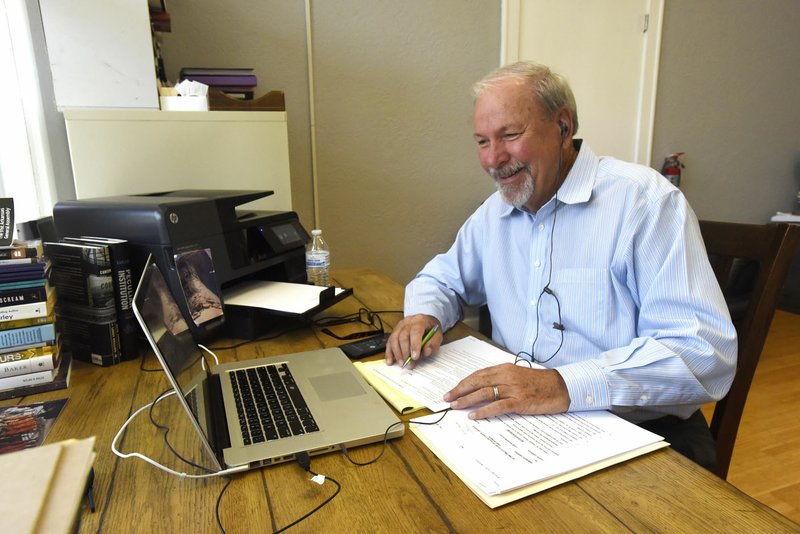BENTONVILLE -- Court battles scared his clients, Scott Smith said, even when they won.
Domestic cases such as divorce and child custody damaged needed relationships and were costly to litigate, the Fayetteville attorney said. Smith, a lawyer for more than 32 years, became a mediator in 2000.
Mediator standards
To be certified, a mediator must meet specific education, training, practical experience, and ethics standards. The standards vary depending on the category of certification. The categories of certification correspond to the divisions of the circuit court: civil certification, probate certification, domestic relations certification, and juvenile certification.
Source: Arkansas Access and Visitation Mediation Program
Mediation v. arbitration
Mediation involves a third person who attempts to help resolve a legal matter between two parties.
Arbitration involves the parties agreeing to allow someone acting as a judge to hear the case and then make a decision. The parties then have to abide by the decision.
Source: Staff report
He conducted four to six mediations his first three or four years -- mostly domestic cases, but sometimes car wrecks or other similar civil actions, he said. He now handles 50 t0 60 a year.
Mediation as an alternative to litigation is increasing in Northwest Arkansas and across the state. According to the Arkansas Alternative Dispute Resolution Commission, 378 cases were resolved with mediation in 2013; 400 cases in 2014 and 500 cases in 2015.
Mediators have to report when talks ordered by judges are resolved, so those are the only statistics tracked by the commission.
No reporting requirement means there's no way to track the not court-ordered mediation, said former Benton County Circuit Judge Jon Comstock, who is now a mediator. But mediators in the region said those numbers also are seeing significant growth.
"I can just tell you that my experience is that about one-half of my mediation are not court-ordered," Comstock said.
Settling disputes through mediation saves money, eases the court caseload and generally leaves the opposing parties in a better state of mind, mediators and attorneys said.
"I have been an attorney for over 32 years now, and I can honestly say that when we reach a successful mediated agreement, both sides of the case shake my hand and express their appreciation," Smith said. "They even walk to their cars together and actually talk.
"But I can recall many times where I, as a lawyer, tried a contested case and my client prevailed in the decision, but that client never shook my hand or said 'thanks."'
Behind the Trend
Attorneys on their own can go to a mediator, and some mediations take place before lawsuits are filed, Benton County Circuit Judge Doug Schrantz said.
Bentonville attorney Eldon Cripps said he wanted to become a mediator after he saw it work as an attorney in domestic-relations cases for more than 27 years.
"It is satisfying seeing people resolve their disputes, and helping them navigate that settlement without a judge having to tell them how it will be resolved," Cripps said.
Ray Fulmer has been involved in mediation while representing clients. Fulmer was the trustee for the estate of Veg Liquidation, which was Allens Inc. The bankruptcy case was resolved earlier this year through mediation with a $4.8 million settlement.
"A good mediator tells both parties the strong points of their cases, but also emphasizes the weak points," Fulmer said.
Mediation is about finding common ground, he said. For example, a person's relative dies during a surgical procedure and being objective about that is hard.
"It may take a third party to say your relative had a bad heart that led to the results," he said.
The increase in mediation meant some growing pains at first as attorneys familiarized themselves with a new process, Smith said.
"Once the attorneys realized mediation was better than the old-fashioned way of exchanging settlement offers back and forth through the mail, they became more open to the process. And now many domestic relations attorneys go to mediation as a regular part of their bigger divorce and custody cases," he said.
Judges differ on if and when they order mediation. Benton County Circuit Judge Doug Schrantz said he doesn't force any parties into mediation, but orders it when attorneys request it.
Washington County Circuit Judge Cristi Beaumont advocates for mediation when possible.
"They can always come to me and ask to be relieved of that obligation and I will look at the case and the circumstances and determine it based on that," Beaumont said. "But I'm a big proponent of mediation. I think it's extremely useful and helpful in the justice system."
Many Motivations
Cost usually motivates parties to try mediation, said Bentonville attorney Mike Armstrong. Armstrong said he resolves 10 to 15 of his divorce cases each year through mediation. Alimony and child support are the biggest obstacles, he said.
"It avoids the expense of litigation," he said.
The cost of divorce mediation is generally 40 percent to 60 percent less than divorce litigation, according to the American Bar Association. Mediation almost always will be less expensive since both parties work together, which decreases the time attorneys charge for, according to the association.
Adrienne L. Krikorian, a mediator and an administrative law judge with the California Office of Administrative Hearings, writes on mediate.com that the cost of mediating a case is minimal compared to the costs incurred through the life of a lawsuit.
Smith said he believes the main reason for the increase in mediation is that the opposing sides get to decide the resolution rather than having a judge impose one.
"In mediation, the parties are able to craft a unique agreement specifically tailored to their facts, which is oftentimes creative in its result. The judges are much more limited in what they can do to resolve a contested case and do not have the same opportunities to be creative," he said.
Benton County Circuit Judge Robin Green said that when successful, mediation eases a court's caseload.
"The parties benefit by avoiding the greater cost of litigation and too, by participating in the resolution of their case, rather than having a third party dictate the terms," Green added.
Comstock agreed.
"I've never heard a judge complain about cases going away," he said.
No Panacea
Mediators cannot force or coerce people to resolve cases, Comstock said.
"I have no authority," he said. "I can't even make the people stay if they want to leave."
The parties' attitudes are vital to a successful mediation, Armstrong said. If both parties come in with a willingness to compromise then mediation probably will be successful, he said.
Cripps has done many mediations where one or both attorneys said they didn't think there was any chance the case could be settled, but if the parties come to the table with an open mind and are willing to negotiate the parties probably will be happy with the agreement they reach.
Cripps has used a mediator in numerous cases when he was the attorney for one side.
"It is probably more difficult sitting as a mediator and trying to restrain the attorney in me from just telling the parties what they should do," he said. "Instead, as a mediator, I need to try and ask questions or pose scenarios that get them to think outside the box so they can come up with their own solution."
Rogers attorney Ken Swindle supports mediation, but believes a judge should decide when or if a case goes to mediation.
"Mediation can be a very useful tool judges can use in their discretion to help cases to settle, but I would not be in favor of taking that discretion away from judges," Swindle said. "Experienced attorneys usually know when mediation can help and when it cannot, and judges have a good sense of that, too."
Mediation doesn't work all the time. What is said in mediation is confidential, so if the parties do end up in court, the judge does not know what was said. Armstrong has experienced mediations where people were unwilling to compromise from the moment they walked in the room.
"Sometimes you have to let judges decide," he said. "That's what they get paid for."
NW News on 10/02/2017

